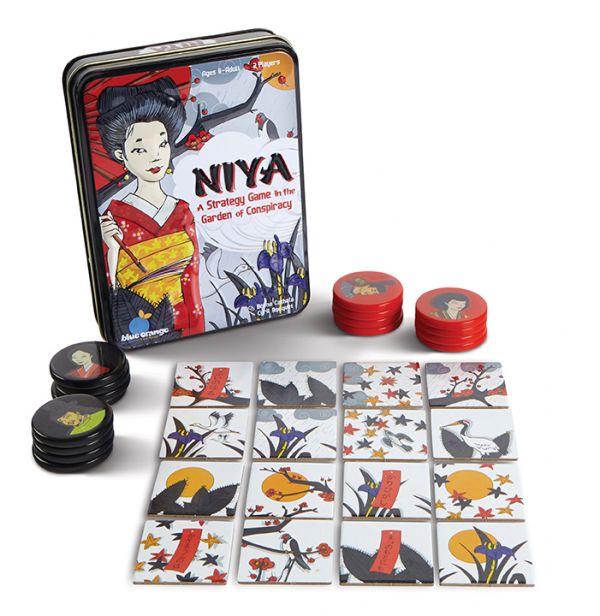Deception in the Imperial Garden: A Review of Niya

Tense silence gripped the room as final tokens of Niya were placed, until a gloating "I win!" broke the spell. Truth be told, there were still two moves left in the game, but the winner had been decided. Niya, by Blue Orange Games is a small strategy game that adds a twist and depth to the common game mechanic of lining up patterns. Within a few moments we had the game set up and knew the rules, and gameplay was fast yet thoughtful.
Gameplay
This 2-player game takes place in the imperial garden, 16 tiles arranged in a 4x4 square. The tiles have two aspects: one is a plant (maple leaves, cherry tree, pine tree, or iris), and the other is a Chinese poetic symbol (rising sun, poem flag, bird, or rain cloud).
Each player is given 8 tokens, either red or black. Players take turns "claiming" part of the garden by replacing a tile with one of his or her tokens. The next player must claim a tile that matches one of the aspects of the previous tile (the plant or the poetic symbol). This allows players to force their opponent to replace only certain tiles and set themselves up for further success.
The game is won by forming a horizontal, diagonal, or a vertical row of four, a 2x2 square of tokens, or eliminating all possible moves for your opponent.
The key to winning comes in the early game. The first player to get 3 of the 4 tokens in a successful pattern has a significant advantage because they block many of the options for the other player. Success is almost guaranteed if a player has two sets of three. Winning by preventing a player from moving usually only happens when a player gets too wrapped up in their own offensive strategy.

Review
The Chinese garden theme of Niya is very elegant, although it is an abstract game at its core. The artwork fits well with the theme, although a few of the tiles can be confusing at first. All of the components of this game are of very high quality and they come neatly organized in a nice tin.
The game can be learned very quickly, and it moves quickly if both opponents are decisive. Our experience with Niya was very thought-provoking; most of the game was spent in silence. In terms of gameplay, there is a solid balance between building combos and preventing the schemes of your opponent. Between games, we found ourselves strategizing new patterns and game winning combos.
Niya is strictly strategic; there is no element of luck. However, the random arrangement of tiles adds a little variety and replayability to the game. This is a good game for the strategists in the family, but perhaps not for players of different skill levels or the impossibly lucky person. If you're looking for a small, quick, casual strategy game, you should give this one a try.
Pros: Adds sophistication to pattern forming games, durable & high quality components
Cons: Not a lot of variation between plays







